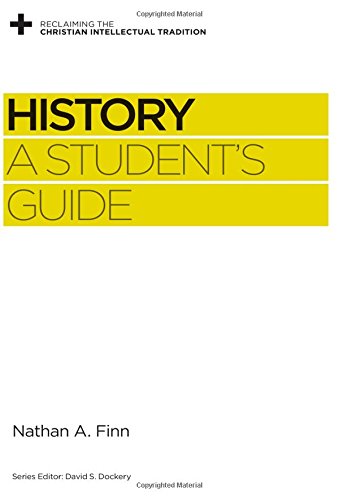Reviewed by Andrew J. Spencer
Introduction
How should a student approach the academic discipline of History from the Christian Intellectual Tradition? This is the question the latest edition from the Crossway series, Reclaiming the Christian Intellectual Tradition, seeks to answer. The answer is provided by Nathan Finn, who currently serves as dean of the School of Theology and Missions and professor of Christian thought and tradition at Union University.
With a brief introduction and four chapters, this is not a book that will consume a great deal of time for intake and digestion. However, for a college student seeking to make sense of the methods of historians and consider the vocation of historian, this book may provide just the thing they are looking for.
Survey
The call to study history has a treasured place within the Christian tradition. As Finn points out in his introduction, “Christians should be keenly interested in studying the past since the very truth of the Judeo-Christian tradition is dependent upon certain historical events.” (pg. 19) As a distinctly historic religion, Christianity cannot afford to neglect the study of history as an academic discipline. He even argues that Christians have significantly influenced the way that history is now done, particularly by bringing a linear understanding to history, offering human sinfulness as an explanation for past ills, and presenting a thick account of human freedom. History, as it is now done, owes much to the Christian tradition and thus should not be abandoned by Christians.
In the first chapter, Finn offers the briefest of introductions to history as a discipline. History is an effort to understand the past, but it is not the past itself. Finn explains that objectivity is desired, but it is also impossible. The quest for authentic knowledge of the past requires the use of certain tools, Finn explores the available options and explains their value. This chapter contains the terms that an aspiring historian needs to know so that she can more carefully determine the nature of history as a vocation.
Chapter Two offers an outline of the various approaches to history. Although monographs have been written on each approach, Finn manages to explain the essence of five distinct approaches in this brief chapter. He offers as options: cyclical history, history as progress, historicism, Marxist history, and Judeo-Christian history. Apart from the benefit to those deciding whether they should major in History in college, this sort of analysis is helpful to readers not trained in history to understand the differences between books written on the same topic that come to vastly different conclusions.
In the third chapter, Finn tackles the place of the historian’s faith in doing history. It was not too long ago that Christian historians were quick—often too quick—to find the hand of Providence in history. Every coincidence was directly attributed to God’s handiwork, often leading to insufficient consideration of the roles of human actors in the historical events. This error was then overcorrected by secular historians who seem to discount the possibility of God’s acting in history. One example that Finn outlines is of Harry Stout’s biography of evangelist George Whitefield, where Stout, himself a believer, attributes all of Whitefield’s success in preaching to his skill as an actor instead of the work of the Holy Spirit. Finn argues for a mediating position, where the Christian historian develops the ability to argue for providence in works written for the church but still maintain the sort of objectivity to communicate history in terms that will be academically accepted to the scholarly community.
In Chapter Four, Finn issues an invitation to the reader to study history. He notes that it matters for society as a whole. The discipline trains the mind to be rigorous, to search for answers, and to think clearly. Thus, history can equip the student for a multiplicity of careers. Finally, history is essential to the well-being of the Church. As Finn argues, Christianity is, perhaps, the most historically dependent religion. Thus there need to be men and women of faith engaging in history from a Christian perspective to help outbalance the skeptical revisionism of many contemporary scholars. Even in its most academic form, doing history well can offer a powerful ministry to the body of Christ.
Reflections
Finn writes well, which makes this pleasant to read. He enjoys his academic discipline, which makes his case compelling. In this age where history seems to be regularly rewritten to put the Judeo-Christian tradition in the worst light, the call to do history as a person of faith has, perhaps, never been so urgent. The greatest strength of this volume is the winsome case it makes for Christian engagement in the vocation of history.
The book is limited by its format. It is a primer on the topic, not a scholarly work. It summarizes some very nuanced topics, thus risking criticism for generalizations. The book describes the benefits of being a history major, but it does not dwell on the sometimes tedious and often difficult task of historical research. The nature of the book is to make a positive case at an overview level. It does this well, but those expecting more should look elsewhere.
Whether used as a gift to prospective History student, as a course text in an introductory course, or simply for an entertaining read, History: A Student’s Guide is worth the time to read it. This will be a useful resource and a blessing to many Christians for years to come.
Andrew J. Spencer is Director of Assessment and Institutional Research, Oklahoma Baptist University.
